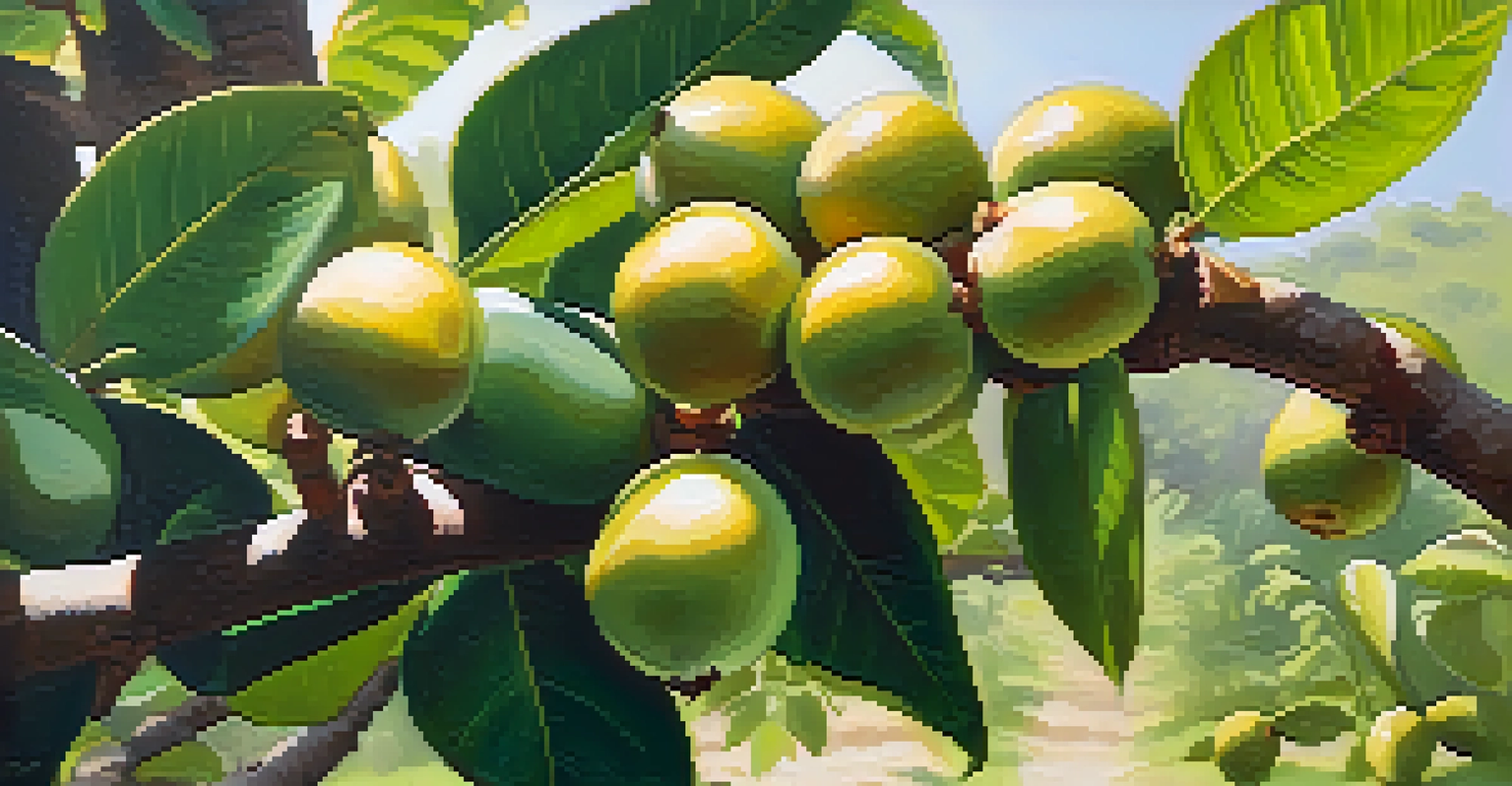Hawaii's Agricultural Exports and Economic Contributions

Overview of Hawaii's Unique Agricultural Landscape
Hawaii's agricultural landscape is as diverse as its culture, shaped by unique climatic conditions and rich volcanic soil. The state produces a wide range of crops, from tropical fruits like pineapple and papaya to specialty coffee and macadamia nuts. This diversity not only serves local consumption but also positions Hawaii as a hub for premium agricultural exports. The islands' isolation has led to the development of niche markets that are both sustainable and economically viable.
Agriculture is our wisest pursuit, because it will in the end contribute most to real wealth, good morals, and happiness.
The state's agricultural sector is not just about traditional farming; it also embraces innovative practices and organic farming. Farmers are increasingly adopting sustainable methods that preserve the environment while boosting productivity. This commitment to sustainability resonates with the growing global demand for eco-friendly products, further enhancing Hawaii's export potential.
Additionally, Hawaii's agricultural exports play a crucial role in maintaining the local economy, providing jobs and supporting rural communities. The industry is a vital part of Hawaii's cultural identity, as many farming practices have been handed down through generations. Understanding this unique landscape is essential to appreciate the broader economic contributions of agriculture in Hawaii.
Key Agricultural Products Exported from Hawaii
Hawaii is renowned for its premium coffee, particularly Kona coffee, which is considered one of the best in the world. The unique flavor profile, developed by the region's specific climate and volcanic soil, makes it highly sought after in international markets. Other notable exports include macadamia nuts, which have gained popularity for their rich taste and health benefits, showcasing Hawaii's capability to produce high-quality specialty products.

Tropical fruits like pineapples and papayas are also significant contributors to Hawaii's agricultural exports. These fruits not only satisfy local demand but are also shipped to various global destinations, appealing to consumers looking for exotic flavors. The islands’ unique growing conditions allow for year-round production, giving Hawaii a competitive edge in the fruit export market.
Hawaii's Diverse Agricultural Exports
Hawaii's unique climate and volcanic soil enable the production of a variety of high-quality agricultural products, including coffee, tropical fruits, and macadamia nuts, which are in high demand globally.
Moreover, the state's flower and nursery industry adds another layer to its agricultural exports. Hawaii is known for its beautiful orchids and other ornamental plants, which are exported worldwide. This sector not only enhances Hawaii's export portfolio but also supports local economies through job creation and tourism.
Economic Impact of Agricultural Exports on Hawaii
Agricultural exports play a pivotal role in Hawaii's economy, contributing significantly to the state's GDP. The export of high-value crops and products generates substantial revenue, which is reinvested into local businesses and communities. This economic cycle helps sustain jobs in agriculture, processing, and distribution, providing livelihoods for thousands of residents.
The future will be green, or not at all.
In addition to direct economic benefits, agricultural exports also promote tourism, as many visitors seek to experience Hawaii's unique agricultural offerings. Farm-to-table experiences and agricultural tours have become popular, drawing tourists interested in local food culture. This synergy between agriculture and tourism creates a vibrant economic ecosystem that benefits both sectors.
Moreover, the economic contributions of agriculture extend beyond immediate financial impacts. By fostering sustainable farming practices and supporting local producers, Hawaii's agricultural exports help preserve the islands' natural resources. This long-term approach not only benefits the economy but also ensures a healthy environment for future generations.
Challenges Facing Hawaii's Agricultural Sector
Despite its strengths, Hawaii's agricultural sector faces several challenges that threaten its sustainability and growth. One significant issue is the high cost of production, driven by factors such as labor expenses and the need for imported materials. These costs can hinder the competitiveness of local products in both domestic and international markets.
Environmental factors, such as climate change and invasive species, further complicate the agricultural landscape. Farmers are increasingly dealing with unpredictable weather patterns and pests that can devastate crops. Addressing these challenges requires innovative solutions and support from both the state and federal governments to ensure the resilience of Hawaii's agriculture.
Economic Impact on Local Communities
Agricultural exports significantly contribute to Hawaii's economy by generating revenue, supporting jobs, and promoting sustainable practices that benefit both the environment and local communities.
Additionally, the reliance on a few key exports makes Hawaii vulnerable to market fluctuations. If demand for a particular product declines, it can have a ripple effect throughout the economy. Diversifying agricultural production and exploring new markets is essential for mitigating these risks and ensuring long-term economic stability.
The Role of Technology in Modernizing Agriculture
Technology is transforming Hawaii's agricultural sector, helping farmers increase efficiency and productivity. Precision agriculture tools, such as drones and soil sensors, allow farmers to monitor crop health and optimize resource use. These advancements not only boost yields but also promote sustainable farming practices, aligning with global trends toward eco-friendly production.
Moreover, technology facilitates better access to information and resources for local farmers. Online platforms and apps provide essential data on market trends, weather conditions, and pest management techniques. This access to information empowers farmers to make informed decisions, enhancing their competitiveness in the export market.
Furthermore, embracing technology can help Hawaii's agricultural sector adapt to the challenges posed by climate change. Innovative practices, such as hydroponics and aquaponics, are being explored to maximize productivity while minimizing environmental impacts. By integrating technology into traditional farming methods, Hawaii can create a more resilient agricultural system.
Community Support for Local Farmers and Sustainability
Community support plays a vital role in promoting local agriculture in Hawaii. Farmers' markets and community-supported agriculture (CSA) programs enable consumers to connect directly with local producers, fostering a sense of community and shared responsibility. By purchasing locally, residents not only support their economy but also contribute to sustainable farming practices.
Educational initiatives are also crucial in raising awareness about the importance of local agriculture. Schools and community organizations often collaborate to teach children and adults about sustainable farming practices and the benefits of eating local produce. This education can cultivate a new generation of environmentally conscious consumers who appreciate the value of supporting local farmers.
Challenges and Future Innovations
Despite challenges like high production costs and climate change, advancements in technology and community support are key to enhancing the sustainability and resilience of Hawaii's agricultural sector.
Additionally, partnerships between farmers and local chefs or restaurants help promote Hawaii's agricultural products. When chefs feature local ingredients on their menus, it not only enhances their dishes but also highlights the importance of supporting local agriculture. This collaboration can create a thriving ecosystem where consumers, farmers, and businesses work together for mutual benefit.
Future Prospects for Hawaii's Agricultural Exports
The future of Hawaii's agricultural exports looks promising, with an increasing global demand for premium and organic products. As consumers become more health-conscious and environmentally aware, they seek out high-quality, sustainably produced goods. Hawaii's unique offerings position it well to meet this rising demand, especially in niche markets.
Moreover, ongoing innovations in agricultural practices and technology could further enhance productivity and sustainability in the sector. By investing in research and development, Hawaii can continue to improve its agricultural methods, ensuring that they remain competitive in a rapidly changing global market. This commitment to innovation will be key to securing the future of agricultural exports.

Lastly, fostering partnerships between farmers, government agencies, and educational institutions can lead to a more resilient agricultural sector. By working together, stakeholders can share resources, knowledge, and support, paving the way for a sustainable and prosperous future for Hawaii's agricultural exports. Embracing collaboration will be essential in navigating the challenges ahead and maximizing the sector's contributions to the state's economy.